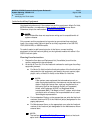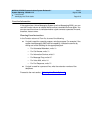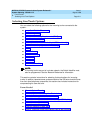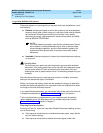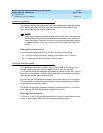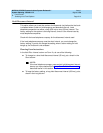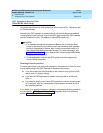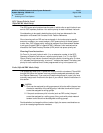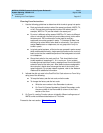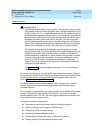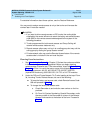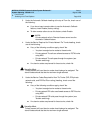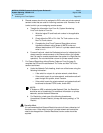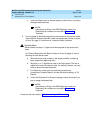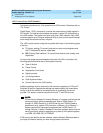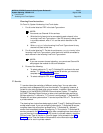
MERLIN LEGENDCommunications System Release 6.1
System Planning
555-661-112
Issue 1
August 1998
Lines/Trunks
Page 3-17Selecting Line/Trunk Options
3
Planning Form Instructions 3
1. Use the following guidelines to determine which trunks to group into pools:
■ Each pool should contain trunks of the same type (basic, WATS, FX,
or tie). Ground-start and loop-start trunks of the same type (for
example, WATS or FX) can be mixed in the same pool.
■ Do not mix different calling areas of WATS or FX trunks to different
cities or include both inbound-only and outbound-only trunks within
the same pool. DID trunks and/or trunks used for auxiliary
equipment cannot be grouped in pools. T1 Switched 56 data lines
should not be mixed with trunks used for voice calls. If you plan to
assign Pool buttons on telephones, do not group dial-in-only tie
trunks in pools.
■ In typical pooled systems, all the trunks are grouped in pools except
those mentioned previously, single special-purpose trunks, and any
basic trunks that are needed as personal lines assigned to a button
on a telephone.
■ Group the trunks for the main pool first. This should be the local
trunks capable of accepting 411, 911, and so on. If your system
includes ground-start basic trunks, reassign them from the dial-890
extension pool to the main pool. After these trunks are assigned to
the main pool, decide how to arrange the rest of the trunks in the
remaining pools. For private network systems, refer to the
Network
Reference
for additional information.
2. Indicate the dial-out code in the Pool/Dial-Out Code column on Form 2c by
doing
one
of the following:
■ To keep the factory set dial-out code, write the code.
■ To change the factory-set dial-out code:
a. Write the new number in the Renumber to column.
b. On Form 2d, System Numbering: Special Renumbers, write
the new number in the Renumber to column of the Pools
section of the form.
3. On Form 2c, use the Function column to identify different calling areas of
WATS trunks and different destinations of FX trunks.
Proceed to the next section, “Remote Access.”



